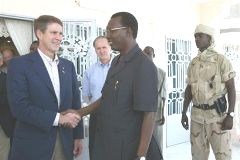US Senate majority leader calls violence in Darfur a genocide
By KAREL PRINSLOO, Associated Press Writer
CAMP TOULOUM, Chad, Aug 07, 2004 (AP) — A leading U.S. lawmaker called attacks on African farmers by Arab militiamen in Sudan’s western Darfur region a genocide, and said that the threat of U.N. sanctions against Sudan was not enough to end the violence.
 As U.S. Senate Majority Leader Bill Frist toured camps in eastern Chad housing hundreds of thousands of people driven from Darfur, the African Union worked to boost the number of troops it plans to send to the region, asking Rwanda to up its contribution from about 150 soldiers to nearly 1,000.
As U.S. Senate Majority Leader Bill Frist toured camps in eastern Chad housing hundreds of thousands of people driven from Darfur, the African Union worked to boost the number of troops it plans to send to the region, asking Rwanda to up its contribution from about 150 soldiers to nearly 1,000.
Although Frist said he believes the threat of sanctions will not end the crisis in Darfur, he stopped short of calling for armed intervention by Western powers _ a move the Sudanese government has threatened to resist with force.
“The goal of today was to have firsthand experience” of the violence unleashed by the Arab militiamen known as Janjaweed, Frist told reporters Friday.
He spent his time in the camp speaking with refugees and aid workers, afterward saying he would “probe what is the relationship between the Sudan government and the Janjaweed.”
Frist, the senior Republican senator of the upper chamber of the U.S. Congress, said he planned to talk to other American lawmakers on how to stop the violence in Darfur. He did not elaborate.
The European Union, the United States and humanitarian groups accuse the Sudanese government of backing the militias known as the Janjaweed with vehicles, helicopters and airplanes _ a claim Khartoum denies.
The violence in Darfur began in February 2003 when two rebel groups from the region’s African tribes took up arms in a struggle over land and resources with Arab countrymen.
Pro-government militias drawn mostly from nomadic Arab tribes then began a brutal campaign to drive black African farming communities out of Darfur.
The United Nations estimates up to 30,000 people have been killed in Darfur, more than a million driven from their homes, and some 2.2 million left in urgent need of food and other aid.
The U.N. Security Council on July 30 passed a resolution giving Sudan 30 days to curb the Janjaweed, or face possible diplomatic and economic penalties.
The U.S. Congress has labeled the atrocities genocide, and Frist said Friday that American lawmakers did not believe the threat of U.N. sanctions against Sudan was enough to quell the violence.
But a day earlier, the United Nations said Sudan had agreed to disarm the Janjaweed and other outlawed groups in Darfur. The agreement was reached Wednesday in Khartoum, U.N. spokeswoman Denise Cook said.
The AU’s request for more Rwandan troops follows a recent promise by the union to increase the size of its planned mission to Darfur and give the troops being sent a mandate to protect civilians, not just the union’s unarmed 150-member monitoring mission.
The AU said July 5 that it would send 300 soldiers to Darfur to protect the monitors. But Wednesday it announced plans to increase the number of soldiers to 1,600-1,800.
Aside from protecting civilians and monitors, the AU said its troops would also help speed the delivery of aid to displaced people and stop the rebels, Janjaweed and government from violating a largely ignored cease fire signed in April.
“We have been requested to send an additional force of about 800 men,” Rwandan Foreign Minister Charles Muligande told The Associated Press. “This will be in addition to the 155 soldiers that we had initially prepared for this mission.”
However, no date has been set for the troops’ arrival in Darfur, as AU and Sudanese officials are still working out the exact mandate of the force, Muligande said in Rwanda’s capital, Kigali.
___
Associated Press reporter Arthur Asiimwe contributed to this report from Kigali, Rwanda.
